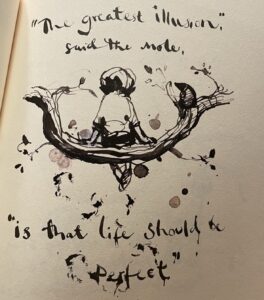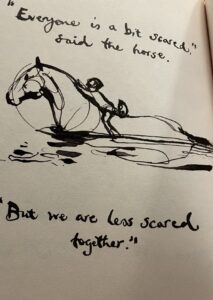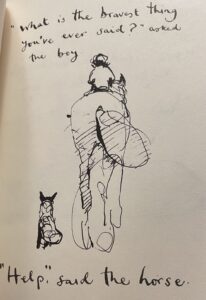01 Nov Isn’t That Interesting!
At Dementia Together, we have the privilege of facilitating a care partner support group-both in-person and online. Deep friendships have formed. Grief is shared. Practical strategies are discussed. And joy abounds so that people who attend feel better when they leave than when they arrive. Our friends feel seen. They feel heard. They feel understood by people who are walking similar journeys. They know they aren’t alone. That’s the goal, anyway. And that’s our heart.
We aren’t perfect at it, but we all continue to try. Together.
When our care partners share difficult situations, we often frame them in SPECAL® (pronounced “speckle”) terms—based on the simple person-centered, family driven model out of the UK which we use in our care partner, professional, and community education. Most care partners discover that the same SPECAL “rules and tools” which promote well-being for their loved ones living with dementia are also useful when applied to themselves.
Nothing contributes more to compassion fatigue, despair, and hopelessness than the voices of self-condemnation which are all too common among care partners striving to care well. The “woulda, coulda, shoulda” voices of condemnation too easily overpower other voices that would otherwise strengthen the ability to thrive in the midst of difficulties. When stressed, we may need practical strategies for reframing situations which seem overwhelming and defeating.
Sometimes with humor, and sometimes with tender camaraderie, SPECAL-informed facilitators and care partners prompt one another to simply find an outrageous event interesting. “Well, isn’t that interesting! THAT didn’t work! Now I can try something else.” Like everything with SPECAL, this approach is not rocket science, but it can be life-changing. Reframing any challenge in light of interesting lessons learned IS success. It beats self-condemnation every time.
Is “success” always easy? Of course not, but care partners discover ways to “successfully” sustain well-being for themselves and their loved ones when they courageously choose to share the journey with people who hold their stories with sacred respect.
These are the people who join them in grief and joy, knowing neither are mutually exclusive.
Sharing life with safe people equally committed to preserving dignity for loved ones whose minds are changing helps reframe the narrative from tragedy to contentment. “Showing a loved one how to eat a taco, accepting yet another rock from the yard as a gift, watching a loved one shred paper all over the house or make unspeakable messes in the bathroom…those situations don’t seem that funny at the time,” but our care partners say they need to “choose to find the humor in the situations.”
One care partner shares, “Maybe there was nothing humorous about the circumstances as they occurred, but in the telling of the story, it really was funny.” In the telling of the story is where we find mercy...and when the situation happens again and we actually see humor in the moment? That’s where we find grace. November is National Family Caregivers month. May anyone bravely reaching out to say, “help,” find mercy and grace when they need it most.
–Cyndy Hunt Luzinski, MS, RN, SPECAL® Practitioner
Executive Director, Dementia Together
Pictures and Quotes from: Mackesy, Charlie. The Boy, the Mole, the Fox and the Horse New York, NY: HarperOne, 2019.




